Vote in the 2025 SIAM Elections
The polls for the 2025 SIAM General Election open Tuesday, September 9, 2025. SIAM membership will elect a President-elect, Vice President-at-Large, and Secretary, as well as three members to the SIAM Board of Trustees and four to the SIAM Council.
The Board has fiduciary responsibility for SIAM and has full legal control of the organization’s assets. The Board is responsible for the management of SIAM, taking into account SIAM’s professional and scientific policies and objectives.
The Council is responsible for formulating scientific policies of SIAM, monitoring its technical activities, proposing new activities, and recommending action to the Board as appropriate. You can review the candidates' biographical information and statements regarding the future direction of SIAM below.
Voting instructions and credentials will be emailed to SIAM members who are eligible to vote on September 9, 2025, when the polls open. The email will come from Election Manager at noreply@directvote.net and the subject will be "2025 SIAM General Election – Polls are now open." The body of the message will provide your unique voting login information and a direct link to submit your ballot. The deadline for voting is Monday, November 3, 2025.
To help reduce the chance that the message with your voting credentials gets caught in your spam filter, you may want to configure your email to allow communications from noreply@directvote.net.
It is important that you take the time to vote. Members elected to SIAM leadership govern SIAM's activities and make important decisions for the organization on your behalf. Questions regarding the election process can be directed to the SIAM Election Manager. Thanks in advance for your vote!
President-Elect
Vice President-at-Large
Secretary
Board of Trustees
- John Abbott
- David Keyes
- Ulrike Meier Yang*
- Yasumasa Nishiura
- Bonita V. Saunders*
- Konstantina Trivisa
Council Members-at-Large
- Luis Chacon
- Rachel Levy
- Kengo Nakajima
- William Pack
- Noemi Petra
- Jennifer K. Ryan
- Jeffrey R. Sachs
- Jorge X. Velasco-Hernandez
*indicates incumbent
Candidate Profiles
President-Elect
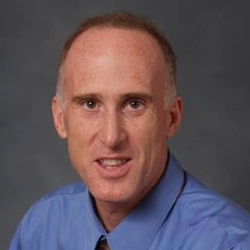
James G. Nagy
Affiliation:
Emory University
Professional Experience:
Professor, Samuel Candler Dobbs, Emory University (2018-present)
Department chair, Mathematics, Emory University (2018-present)
Professor, Mathematics, Emory University (2006-2018)
Associate professor, Mathematics, Emory University (1999-2006)
Associate professor, Mathematics, Southern Methodist University (1997-1999)
Assistant professor, Mathematics, Southern Methodist University (1992-1997)
Postdoctoral research associate, Institute for Mathematics and Its Applications, University of Minnesota (1991-1992)
Education:
Ph.D., Applied mathematics, North Carolina State University (1991)
M.S., Computational mathematics, Northern Illinois University (1998)
B.S., Applied mathematics, Northern Illinois University (1986)
SIAM Activities:
Faculty advisor, Emory University SIAM Student Chapter (2003-present)
SIAM Vice President for Programs (2020-2025)
Chair, Committee on Programs and Conferences (2020-2025)
SIAM Representative to the International Council for Industrial and Applied Mathematics (ICIAM) Board (2020-2025)
Chair, SIAM Fellows Selection Committee (2018-2019)
Member, SIAM Fellows Selection Committee (2017-2019)
Chair, SIAM Activity Group on Linear Algebra (2016-2018)
Vice chair, SIAM Activity Group on Linear Algebra (2013-2015)
Co-chair, SIAM Conference on Applied Linear Algebra (2015)
Member, Editorial board, SIAM Journal on Matrix Analysis and Applications (2006-2020)
Member, Editorial board, SIAM Journal on Scientific Computing (2005-2019)
Member, Editorial board, SIAM Undergraduate Research Online (2007-2014)
Member, Editorial board, Fundamentals of Algorithms book series (2004-2010)
Organizer, numerous minisymposia at several different SIAM conferences
Professional Memberships:
Fellow, Society for Industrial and Applied Mathematics (2016)
Member, Society for Industrial and Applied Mathematics
Member, SIAM Activity Group on Applied Mathematics Education
Member, SIAM Activity Group on Computational Science and Engineering
Member, SIAM Activity Group on Data Science
Member, SIAM Activity Group on Equity, Diversity, and Inclusion
Member, SIAM Activity Group on Imaging Science
Member, SIAM Activity Group on Linear Algebra
Member, American Mathematical Society
Member, International Linear Algebra Society
Research Interests:
Numerical linear algebra
Inverse problems
Image processing
Website:
https://www.math.emory.edu/~nagy/
Candidate Statement:
I have deeply valued and enjoyed my many years in the SIAM community. This involvement has enriched me both personally and professionally and inspired me to establish a SIAM student chapter at Emory in 2003 to share these benefits with students. Serving as the chapter's advisor for the past 22 years has been both rewarding and a great deal of fun. I have also enjoyed serving on editorial boards for SIAM's leading journals and books, contributing to conference organizing committees, serving in officer positions for an activity group, and, most recently, serving as Vice President for Programs for the past six years. In that role, I had the privilege of working closely with leaders of all the activity groups, four different SIAM presidents, and participating in both SIAM Council and Board meetings. These experiences have reinforced my view that SIAM's strength lies in its many dedicated members who volunteer their time, and in the equally dedicated SIAM staff who make so much possible.
It is important to recognize that we face many challenges, including strengthening ties to early career professionals in industry, labs, and academia; adapting to pressures on the conference model; keeping pace with rapid technological change; addressing potential significant financial implications posed by open access publishing mandates; and addressing the rapidly changing practices surrounding the use of LLMs in journal article writing.
Yet each challenge also represents an opportunity. SIAM's credibility and technical expertise position it to play a vital role in shaping science policy, both directly through advocacy and indirectly through public education. Newly established activity group webinars, along with minitutorials at conferences, can help our community remain engaged in emerging fields with practices such as just‑in‑time learning to develop modular training that responds swiftly to technological and industry shifts. I believe we should continue to experiment with new conference formats to enhance accessibility and participation while managing costs. In the publishing area, we should continue to explore open access models that are financially sustainable and equitable for readers and authors. And, as LLMs reshape scholarly writing practices, SIAM can lead by establishing clear, transparent policies and offering guidance on responsible, reproducible research communication.
As SIAM President, I would welcome the opportunity to continue to work with the many SIAM members and staff to confront the challenges we face, while also helping to identify and seize opportunities along the way that will help advance the important missions of SIAM.
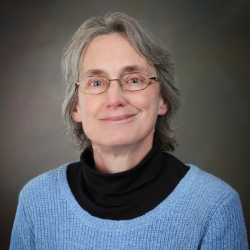
Cynthia Phillips
Affiliation:
Sandia National Laboratories
Professional Experience:
Laboratory fellow, Sandia National Laboratories (2023-present)
Senior scientist, Sandia National Laboratories (2010-2023)
Distinguished member, Technical staff, Sandia National Laboratories (2000-2010)
Principal member, Technical staff, Sandia National Laboratories (1998-2000)
Senior member, Technical staff, Sandia National Laboratories (1990-1998)
Education:
Ph.D., Computer science, Massachusetts Institute of Technology (1990)
B.A., Applied mathematics, Harvard University (1983)
SIAM Activities:
Member, Human Resources Committee (2025-2027)
Member, Selection committee, SIAM Activity Group on Optimization Test of Time Award (2026)
Member, Selection committee, SIAM Activity Group on Supercomputing Career Prize (2026)
Member, Selection committee, SIAM Activity Group on Supercomputing Early Career Prize (2026)
Member, Program committee, SIAM Conference on Parallel Processing for Scientific Computing (2026)
Chair, SIAM Fellows Selection Committee (2025)
Invited plenary speaker, SIAM Conference on Applied and Computational Discrete Algorithms (2025)
Member, Organizing committee, SIAM Conference on Computational Science and Engineering (2025)
Member, SIAM Board (2024-2026)
Member, SIAM Fellows Selection Committee (2024)
Member, Selection committee, George B. Dantzig Prize (2024)
Member, Steering committee, SIAM Symposium on Algorithm Engineering and Experiments (2022-2024)
Member, Organizing committee, SIAM Conference on Applied and Computational Discrete Algorithms (2023)
Member, Program committee, SIAM Conference on Applied and Computational Discrete Algorithms (2023)
Chair, SIAM Ethics Committee (2021-2023)
Co-chair, Program committee, SIAM Symposium on Algorithm Engineering and Experiments (2022)
Member, Organizing committee, SIAM Conference on Discrete Mathematics (2022)
Chair, SIAM Activity Group on Applied and Computational Discrete Algorithms (2021-2022)
Member, Organizing committee, SIAM Conference on Applied and Computational Discrete Algorithms (2021)
Chair, Selection committee, George Pólya Prize in Applied Combinatorics (2021)
Member, Selection committee, George Pólya Prize in Applied Combinatorics (2020)
Member, Program committee, SIAM Symposium on Algorithm Engineering and Experiments (2020)
Member, Program committee, SIAM Workshop on Combinatorial Scientific Computing (2020)
Founding secretary, SIAM Activity Group on Applied and Computational Discrete Algorithms (2019-2020)
Member, SIAM Ethics Committee (2019-2020)
SIAM Vice President of Programs (2014-2019)
Member, Program committee, SIAM Workshop on Combinatorial Scientific Computing (2018)
Member, Program committee, SIAM Workshop on Network Science (2015, 2016)
Member, SIAM Committee on Programs and Conferences (2010-2015)
Invited plenary speaker, SIAM Conference on Optimization (2014)
Member, Program committee, SIAM/ACM Symposium on Discrete Algorithms (2014)
Member, SIAM Nominating Committee (2011-2012)
Chair, SIAM Activity Group on Supercomputing (2010-2011)
Co-chair, SIAM Conference on Parallel Processing for Scientific Computing (2010)
Member, Oversight board, SIAM Mathematics in Industry Study (2008-2011)
Semi-plenary invited speaker, SIAM Annual Meeting (2009)
Program director, SIAM Activity Group on Supercomputing (2008-2009)
Member, Program committee, SIAM Symposium on Algorithm Engineering and Experiments (2007)
Plenary speaker, SIAM Conference on Parallel Processing for Scientific Computing (2004)
Member, Program committee, SIAM/ACM Symposium on Discrete Algorithms (1999)
Professional Memberships:
Fellow, Society for Industrial and Applied Mathematics (2016)
Member, Society for Industrial and Applied Mathematics
Member, SIAM Activity Group on Applied and Computational Discrete Algorithms
Member, SIAM Activity Group on Computational Science and Engineering
Member, SIAM Activity Group on Data Science
Member, SIAM Activity Group on Discrete Math
Member, SIAM Activity Group on Equity, Diversity, and Inclusion
Member, SIAM Activity Group on Optimization
Member, SIAM Activity Group on Supercomputing
Distinguished Scientist (Member), Association for Computing Machinery
Member, Institute of Electrical and Electronics Engineers
Member, Institute for Operations Research and the Management Sciences
Research Interests:
Combinatorial optimization
Algorithm design and analysis
Parallel computation
Network science
Many applications
Website:
https://www.sandia.gov/ccr/staff/cynthia-ann-phillips
Candidate Statement:
SIAM has many strengths, including a true community that excels in research, speaking, and mentoring. SIAM has outstanding staff and dedicated volunteers who proactively work to anticipate issues and evolve SIAM's programs and services. The October 2024 Quantum Intersections Convening was a good step toward adding quantum algorithms and general quantum computing to our members' research portfolios. SIAM can and should play a role in the (r)evolution of artificial intelligence (AI), including better understanding its mathematical foundations and finding ways to make it more trustworthy. Although AI industry leaders have many conference invitations, I hope SIAM can find special ways to involve them that they will find exciting and useful.
SIAM has some long-term challenges. For many years, SIAM has anticipated reduced revenue from journals as more papers become freely available. For example, the U.S. Office of Science and Technology Policy posts a version of all government-funded research about a year after publication. With current pressure on university funding, libraries may cut journal subscriptions. SIAM has been creative in slowing the decline in journal revenue and is actively developing new funding streams. The relatively new development department has successfully found organizations and individuals eager to help SIAM achieve its mission. But SIAM will need to find multiple new ways to support its activities.
What I believe will be temporary issues caused by the U.S. administration's priorities seem looming and urgent. SIAM is partnering with fellow societies for awareness and best practices. Conference attendance may drop due to lower travel budgets, difficulty for U.S. government/labs researchers and U.S.-based foreign students to travel outside the U.S., and international researchers not wanting to travel to the U.S. SIAM commits to locations up to two years in advance, so it will take time for these issues to influence conference location. And there is no optimal location. SIAM should continue its outstanding science policy work, including training the next generation of leaders and advocating for mathematics funding. The latter will be more difficult since there will be new faces at agencies that have traditionally funded applied math, such as the Department of Energy and the National Science Foundation, and every area cut will have its advocates.
I commend SIAM for welcoming all who use applied mathematics broadly and providing extra career support to those who need it or might otherwise be overlooked. SIAM can follow rules and delicately negotiate while staying true to its values and mission.
Vice President-at-Large
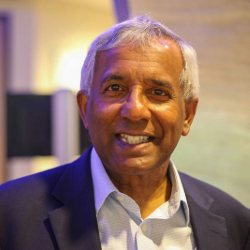
Alex Pothen
Affiliation:
Department of Computer Science, Purdue University
Professional Experience:
Professor, Computer science, Purdue University (2008-present)
Director, CSCAPES Institute, funded by the U.S. Department of Energy (2006-2012)
Richard Cheng Chair and professor, Computer science, Old Dominion University (1994-2008)
Research scientist, ICASE, NASA Langley Research Center (1994-2002)
Research associate professor, Computer science, University of Waterloo (1992-1994)
Assistant professor, Computer science, The Pennsylvania State University (1984-1992)
Education:
Ph.D., Applied mathematics, Cornell University (1984)
B.S. and M.S., Integrated degree in chemistry, Indian Institute of Technology, Delhi (1973-1978)
National Science Talent Scholar, Indian Institute of Technology, Delhi (1973-1978)
SIAM Activities:
Chair, SIAM Committee on SIAM Activity Groups (2025-2027)
Member, SIAM Committee on Science Policy (2020-2026)
Associate editor, SIAM Journal on Scientific Computing (2023-2025)
Member, Steering committee, SIAM Quantum Intersections Convening (2024)
Member, SIAM Committee on SIAM Activity Groups (2022-2024)
Recipient, George Pólya Prize in Applied Combinatorics (2021)
Member, SIAM Fellows Selection Committee (2019-2021)
SIAM News liaison, SIAM Activity Group on Applied and Computational Discrete Algorithms (2019-2020)
Founding chair, SIAM Activity Group on Applied and Computational Discrete Algorithms (2018-2020)
Co-chair, Steering committee, Combinatorial Scientific Computing (CSC) community (2000-2018)
Associate editor, SIAM Review (2009-2017)
Chair, Selection committee, George Pólya Prize in Combinatorics (2015-2016)
Member, SIAM Book Committee (2009-2015)
Member, SIAM Committee on Committees and Appointments (2011-2013)
Associate editor, SIAM Journal on Scientific Computing (2005-2010)
Member, Selection committee, George Pólya Prize in Combinatorics (2007-2008)
Professional Memberships:
Fellow, Society for Industrial and Applied Mathematics (2018)
Fellow, American Association for the Advancement of Science (2024)
Fellow, American Mathematical Society (2024)
Fellow, Association for Computing Machinery (2022)
Member, Society for Industrial and Applied Mathematics
Member, American Association for the Advancement of Science
Member, American Mathematical Society
Member, Association for Computing Machinery
Research Interests:
Applied and computational discrete algorithms
Combinatorial scientific computing
High-performance computing
Data analytics
Website:
http://www.cs.purdue.edu/homes/apothen
Candidate Statement:
SIAM has been my professional home since 1984. With colleagues, I helped found the Combinatorial Scientific Computing community in the early 2000s and organized eight biennial SIAM workshops on CSC. More recently, I led the organization of the SIAM Activity Group on Applied and Computational Discrete Algorithms (ACDA), served as its founding Chair, initiated the SIAM ACDA conference series, and helped grow the activity group to several hundred members.
I have participated in fruitful discussions within the SIAM community about organizing new research initiatives and improving activity groups, conferences, journals, and prizes. Activity groups make SIAM an intimate community for us, and their flourishing is vital to the health of SIAM. Through my service as the chair of an activity group and as the chair of the Committee on SIAM Activity Groups, I am familiar with the distinct challenges that the smaller and larger activity groups face. I will work with the Board and Council to find solutions to these challenges, especially in the current climate of decreased funding for science. I will work to ensure that SIAM promotes emerging research areas and supports students who are the next generation of applied mathematicians. I will also work to strengthen SIAM’s commitment to diversity, equity, and inclusion, providing a welcoming and supportive environment for all.
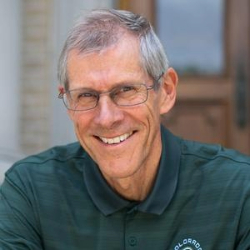
Simon Tavener
Affiliation:
Colorado State University
Professional Experience:
Executive associate dean, Colorado State University (2024-present)
Professor, Mathematics, Colorado State University (2001-present)
Interim dean, Colorado State University (2022-2024)
Executive associate dean, Colorado State University (2017-2022)
Associate dean, Colorado State University (2012-2017)
Visiting fellow, Oxford Center for Collaborative Applied Mathematics (2011)
Chair, Mathematics, Colorado State University (2003-2011)
Visiting fellow, Oxford Center for Collaborative Applied Mathematics (2010)
Associate professor, Mathematics, Colorado State University (2000-2001)
Associate professor, Mathematics, The Pennsylvania State University (1995-2000)
Assistant professor, Mathematics, The Pennsylvania State University (1989-1995)
Postdoc, The Pennsylvania State University (1987-1989)
Postdoc, University of Minnesota (1986-1987)
Education:
D. Phil, Physics, Oxford University (1986)
M.E. (Distinction), Auckland University (1983)
B.E. (Honors), Auckland University (1981)
SIAM Activities:
Member, Selection committee, SIAM Prize for Distinguished Service to the Profession (2016-2018, 2010-2015)
Chair, Selection committee, I. E. Block Community Lecture (2012-2018)
Chair, SIAM Committee on Committees and Appointments (2012-2017)
Member, Executive Committee of the Council (2012-2017)
Member, SIAM Major Awards Committee (2012-2017)
Member, SIAM Nominating Committee (2012-2017)
Member, SIAM Council (2012-2017)
SIAM Secretary (2012-2017)
Professional Memberships:
Member, Society for Industrial and Applied Mathematics
Member, American Mathematical Society
Research Interests:
Bifurcation in continuum mechanics
A posteriori error analysis
Weak Galerkin finite element methods
Bayesian inverse problems
Machine learning
Website:
https://www.math.colostate.edu/~tavener/
Candidate Statement:
First and foremost, it is important for SIAM to continue its outstanding work organizing and hosting conferences and publishing premier journals. SIAM must ensure its activity groups flourish. I anticipate, however, that two items will be of the utmost concern to SIAM during the next two years and are likely to dominate many of our professional lives. These are i) a decline in public confidence in the role of science and mathematics and the consequent reduction in financial support for scientific research, and ii) the development and uses of Artificial Intelligence (AI).
While a decline in public confidence and financial support may seem U.S.-centric and SIAM is very much an international organization, I believe there are implications for the wider mathematical community. Many mathematicians now working outside the U.S. have trained as students and postdocs in the U.S., and U.S. mathematicians collaborate with colleagues across the globe. Numerous conferences and workshops are held in the U.S. and there are joint funding opportunities between the U.S. and other countries. The importance of the exchange of ideas and talent between countries is self-evident. Fears of students being discouraged from entering the sciences and early-career researchers being motivated to leave have frequently been expressed. An important role of professional societies is to prepare and present compelling arguments that support the value of their discipline, and mathematics is no exception. Any such efforts will be enhanced by coordinating with other professional societies. The AMS, ASA, and MAA, for example, are natural partners. Increasing efforts to engage the public and decision makers to demonstrate the power and relevance of mathematics should be an especially high priority for SIAM.
Generative AI will change the way we conduct research as well as the research directions many of us will choose to pursue. The enormous energy cost of training and inference means that any improvements in efficiency are significant. Trustworthiness and safety remain ongoing concerns. AI will change the way we train students, and the expectations employers have for our graduates. Generative AI will necessarily change how we evaluate manuscripts for books and journals. SIAM should play a major role in the exchange of ideas and best practices in these areas and, once again, highlight and communicate the role of mathematics in this crucial technology.
Secretary
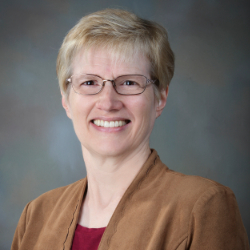
Karen Devine
Affiliation:
Sandia National Laboratories, retired
Professional Experience:
Distinguished member of the technical staff, Sandia National Laboratories' Center for Computing Research (2018-2022)
Principal member of the technical staff, Sandia National Laboratories' Center for Computing Research (2000-2018)
Senior member of the technical staff, Sandia National Laboratories' Center for Computing Research (1996-2000)
Post-doctoral staff, Sandia National Laboratories' Center for Computing Research (1994-1996)
Education:
Ph.D., Computer science, Rensselaer Polytechnic Institute
M.S., Computer science, Rensselaer Polytechnic Institute
B.S., Computer science, Wilkes University
SIAM Activities:
SIAM Secretary (2024-2025)
Chair, SIAM Committee on Committees and Appointments (2024-2025)
Chair, I. E. Block Lecture Committee (2024-2025)
Member, SIAM Major Awards Committee (2024-2025)
Member, SIAM Council (2024-2025)
Member, SIAM Task Force on the Future of Computational Science (2023-2024)
Co-chair, SIAM Conference on Computational Science and Engineering (2023)
Member, SIAM Committee on Committees and Appointments (2022-2023)
Member, Selection committee, SIAM Activity Group on Supercomputing Career Prize (2023)
Member, Selection committee, SIAM Activity Group on Supercomputing Early Career Prize (2023)
Minisymposia organizer and speaker at over 20 SIAM conferences (2003-2023)
Chair, SIAM Activity Group on Computational Science and Engineering (2019-2020)
Secretary, SIAM Activity Group on Computational Science and Engineering (2017-2018)
Vice-chair, SIAM Activity Group on Supercomputing (2014-2015)
Member, SIAM Membership Committee (2010-2015)
Co-chair, SIAM Conference on Parallel Processing (2012)
Professional Memberships:
Member, Society for Industrial and Applied Mathematics
Member, SIAM Activity Group on Supercomputing
Member, SIAM Activity Group on Computational Science and Engineering
Member, SIAM Activity Group on Applied and Computational Discrete Algorithms
Research Interests:
High-performance computing
Modeling and simulation
Load balancing and partitioning
Graph algorithms
Linear algebra
Website:
https://www.linkedin.com/in/karen-devine-8a7722146/
Candidate Statement:
I am honored to have served as SIAM Secretary in 2024-2025. As chair of SIAM's Committee on Committees and Appointments (CCA), the Secretary's biggest role, I led the CCA's efforts to increase the demographic diversity of SIAM committees with respect to geographic location, employer type, and gender. We strove especially to increase participation of SIAM members from industry, increasing industry participation on six of the 14 committees that the CCA handles. We also increased the overall number of non-U.S. and female committee members by 13% and 6%, respectively. In 2025, the CCA will continue efforts to identify strong candidates both in industry and across the SIAM community. (If you are interested in SIAM service, you can volunteer here.)
Going forward, I will continue to advocate for thoughtful inclusion of all SIAM demographics in committees, awards, and opportunities. Such efforts strengthen SIAM through increased membership, relevance, and breadth. They also greatly benefit SIAM members by providing opportunities for career growth, networking, and education. SIAM played an invaluable role in my career; working with the SIAM leadership team, I will continue to extend its advantages to the next generation of members.
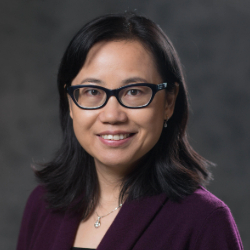
Fengyan Li
Affiliation:
Rensselaer Polytechnic Institute
Professional Experience:
Professor, Department of Mathematical Sciences, Rensselaer Polytechnic Institute (2018-present)
Research fellow, Institute for Computational and Experimental Research in Mathematics (ICERM) (2011, 2020)
Visiting professor, School of Mathematical Sciences, Peking University (2019)
Associate professor, Department of Mathematical Sciences, Rensselaer Polytechnic Institute (2012-2017)
Assistant professor, Department of Mathematical Sciences, Rensselaer Polytechnic Institute (2006-2011)
Long-term visitor, Institute for Mathematics and Its Applications (IMA) (2010)
Postdoctoral fellow, Department of Mathematics, University of South Carolina (2004-2006)
Education:
Ph.D., Applied mathematics, Brown University (2004)
M.Sc., Computational mathematics, Peking University (2000)
B.Sc., Computational mathematics, Peking University (1997)
SIAM Activities:
Member, AWM-SIAM Committee (2024-present, 2015-2017)
Associate editor, SIAM Journal on Numerical Analysis (2019-present)
Associate editor, CSIAM Transactions on Applied Mathematics (2019-present)
Chair, Nominating committee, New York-New Jersey-Pennsylvania Section of SIAM (2024)
Co-organizer, New York-New Jersey-Pennsylvania Section of SIAM Conference (2024)
Co-organizer, Collaborative Research Workshop of ICERM & SIAM (2024)
Chair, SIAM Committee on Section Activities (2022-2023)
Member, SIAM Committee on Section Activities (2018-2023)
Associate editor, SIAM Journal on Scientific Computing (2014-2019)
Member, Organizing committee, SIAM Annual Meeting (2014)
Minisymposia co-organizer and speaker, SIAM conferences (2005-2025)
Professional Memberships:
Fellow, Association for Women in Mathematics (2025)
Member, Society for Industrial and Applied Mathematics
Member, Association for Women in Mathematics
Member, Steering Committee, Women in Numerical Analysis and Scientific Computing
Research Interests:
Scientific computing and numerical analysis
High-order numerical methods for partial differential equations
Reduced order modeling
Kinetic transport simulation, computational electromagnetics, plasma physics, and fluid dynamics
Website:
https://faculty.rpi.edu/fengyan-li
Candidate Statement:
Like many SIAM members, I first became involved in SIAM activities through SIAM’s regional and national conferences. As the leading society for applied and computational mathematicians, SIAM allows me to have a sense of community and belonging. Through SIAM, I have been able to connect with peers, share discoveries, build the network, and learn about emerging trends and directions, all while collaborating to support and strengthen the community and promote diversity in our field. As I progressed professionally, I was increasingly proud to be involved in SIAM and to serve the community in various roles, including Chair of the SIAM Committee on Section Activities and Chair of the Nominating Committee for the New York-New Jersey-Pennsylvania Section of SIAM.
The main role of the SIAM Secretary is to lead the Committee on Committees and Appointments (CCA). The robust involvement of our community is important for the success of SIAM. As we experience rapid changes on many fronts, it remains vital for the CCA to make intentional efforts to ensure broad participation of SIAM members and bring diverse perspectives and experiences to various committees. If elected, it will be my privilege and honor to dedicate my professional and leadership abilities to this mission and to support a strong future for SIAM.
Board of Trustees
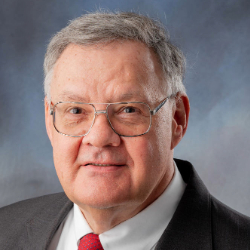
John Abbott
Affiliation:
Corning Incorporated, retired
Professional Experience:
Member, Industrial Advisory Board, New Jersey Institute of Technology, Department of Mathematical Sciences (1996-present)
Development fellow, Corning Inc. (2020-2023)
Associate editor, Institute of Electrical and Electronics Engineers (IEEE)/Optica (OSA) Journal of Lightwave Technology (2018-2023)
Member, editorial board, IET Optoelectrinics (2006-2023)
Senior engineering associate, Corning Inc. (2000-2020)
Engineering associate, Corning Inc. (1995-2000)
Senior project engineer, project engineer, senior engineer, Corning Inc. (1979-1995)
Education:
Ph.D., Mathematics, Massachusetts Institute of Technology (1979)
B.S., Mathematics, California Institute of Technology (1974)
SIAM Activities:
Member, SIAM Industry Committee (2012-2020)
Member, SIAM News editorial board (2012-2016)
Participant, SIAM industry panel discussions, multiple SIAM Annual Meetings
Organizer, minisymposia at several SIAM conferences
Professional Memberships:
Member, Society for Industrial and Applied Mathematics
Member, SIAM Activity Group on Computational Science and Engineering
Member, SIAM Activity Group on Dynamical Systems
Member, SIAM Activity Group on Optimization
Senior member, IEEE
Senior member, Optica (OSA)
Member, Sigma Xi
Member, Tau Beta Pi
Research Interests:
Fluid mechanics, wave propagation, PDEs
Computational science and engineering
Mathematical modeling, governing equations for physical problems
Numerical algorithms and methods
Optimization, inverse problems, and scientific machine learning
Candidate Statement:
SIAM has been central to the growth of the fields of applied and computational mathematics, and I am honored and excited about the opportunity to contribute on the Board of Trustees. I have been working in applied math for more than 40 years, benefiting from my membership and interaction with SIAM. I have seen how applied math has contributed to science and the world and how things that were once barely imagined can now be taken for granted. We want SIAM to be in a position of strength and growth to contribute for another 40-50 years.
My participation in SIAM has included organizing and participating in minisymposia at the annual meeting, participating in panel discussions as a member of the SIAM Industry Committee, and membership on the SIAM News editorial board. Since the early 1990s, I have also participated in many math/industry workshops highlighting collaboration between academia and industry to solve problems of real interest. I have 20+ patents and trade secrets with Corning, including innovations that utilize mathematical advancements to improve industrial processes, measurements, and product designs, primarily in the areas of optical fibers for communication and ultra-flat glass for LCD displays – things used every day all over the world.
In addition to professional experience, I served nine years as an elected school board member in the state of New York, and I currently serve on the board of the Caltech Alumni Association.
SIAM can play a major role in increasing the visibility of mathematics and its part in our economic and technological growth. Increasing communication with other professional societies and the media will support this growth, highlighting problems that need new mathematical methods and the enormous toolbox that can be applied to problems right now.
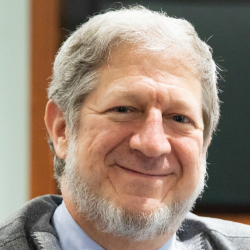
David Keyes
Affiliation:
King Abdullah University of Science and Technology (KAUST)
Professional Experience:
Adjunct professor, Department of Applied Physics and Applied Mathematics, Columbia University (2011-present)
Professor and founding dean, Division of Computer, Electrical and Mathematical Sciences and Engineering, King Abdullah University of Science and Technology (2009-present)
Fu Foundation Chair Professor, Department of Applied Physics and Applied Mathematics, Columbia University (2003-2011)
Acting director, Institute for Scientific Computing Research, Lawrence Livermore National Laboratory (1999-2008)
Richard F. Barry Chair Professor, Department of Mathematics and Statistics, Old Dominion University (1999-2003)
Associate professor, Department of Computer Science, Old Dominion University (1993-1999)
Associate professor, Department of Mechanical Engineering, Yale University (1990-1994)
Associate research fellow and consultant, Institute for Computer Applications in Science and Engineering, NASA-Langley Research Center (1986-2002)
Assistant professor, Department of Mechanical Engineering, Yale University (1986-1990)
Research associate, Department of Computer Science, Yale University (1984-1986)
Education:
Ph.D., Applied mathematics, Harvard University (1984)
M.S., Applied mathematics, Harvard University (1979)
B.S.E., Mechanical and aerospace engineering, Princeton University (1978)
SIAM Activities:
Editorial board, Computational Science and Engineering book series (2003-present)
Chair, SIAM Prize Canvassing Committee (2025)
Member, Selection committee, SIAM Activity Group on Computational Science and Engineering Early Career Prize (2024-2025)
Member, SIAM Prize Canvassing Committee (2021-2024)
Chair, Selection committee, SIAM/ACM Prize in Computational Science and Engineering (2020-2021)
Member, Selection committee, SIAM/ACM Prize in Computational Science and Engineering (2018-2019)
Member, SIAM External Prizes Canvassing Committee (2015-2017)
SIAM Visiting Lecturer (1992-2017)
Member, SIAM Committee on Science Policy (2003-2014)
Member, Organizing committee, SIAM Conference on Computational Science and Engineering (2000, 2003, 2013)
Member, SIAM Membership Committee (2011-2013)
Chair, SIAM Membership Committee (2008-2010)
Member, Organizing committee, SIAM Annual Meeting (2002, 2010)
Member, Selection committee, John von Neumann Prize (2006-2009)
Member, SIAM Committee on Committees and Appointments (2006-2009)
Chair, SIAM Major Awards Committee (2006-2009)
SIAM Vice President-at-Large (2006-2009)
Member, SIAM Committee on Programs and Conferences (2005-2008)
Member, SIAM Council (2000-2005)
Associate editor, SIAM Journal on Scientific Computing (1999-2000)
Member, Organizing committee, SIAM Conference on Parallel Processing (1993, 2001)
Secretary, SIAM Activity Group on Supercomputing (1991-1994)
Professional Memberships:
Fellow, Society for Industrial and Applied Mathematics
Fellow, American Association of the Advancement of Science
Fellow, American Mathematical Society
Member, Society for Industrial and Applied Mathematics
Member, SIAM Activity Group on Computational Science and Engineering
Member, SIAM Activity Group on Supercomputing
Member, American Institute of Aeronautics & Astronautics
Member, American Society of Mechanical Engineers
Member, Association for Computing Machinery
Member, European Association of Geoscientists and Engineers
Member, Institute of Electrical and Electronics Engineers Computer Society
Member, Phi Beta Kappa
Member, Sigma Xi
Member, Society of Exploration Geophysicists
Member, Society of Petroleum Engineers
Member, Tau Beta Pi
Member, The Combustion Institute
Member, U.S. Association for Computational Mechanics
Research Interests:
Computational science and engineering
High-performance computing
Partial differential equations
Linear algebra
Spatio-temporal statistics
Computer science
Fluid dynamics, combustion, and magnetohydrodynamics
Geophysical inversion
Website:
https://cemse.kaust.edu.sa/profiles/david-keyes
Candidate Statement:
SIAM attracts some of the world’s most extraordinary and important people. The modeling, simulation, and machine learning at its heart are increasingly critical to arresting the deterioration of our natural, digital, and social environments and to improving these support systems. Globally, an estimated 150,000 Ph.D. mathematicians support an estimated 4.5 million STEM Ph.D. holders (1 in 30). SIAM members are rarer still, numbering only about 14,000.
Maintaining SIAM’s effectiveness requires continual monitoring and adaptation as new opportunities and stressors appear. After being out of SIAM elected offices for many years to launch and develop KAUST, a project that SIAM News in June 2009 headlined as “The World’s First CSE University”, I am ready to contribute perspective, time, and energy as a member of the Board, if SIAM members so decide. Having benefited immensely from participation in SIAM conference organization, publication review, prize selection, science policy, Council business, and as Vice President-at-Large, serving on the Board would be a fulfilling experience.
As datacenter consumption of electricity is forecast to rise from 5% today towards 12% of the total by 2028 (LBNL projection) and as digital data storage grows by 25-30% annually, SIAM researchers by nature take steps back from “brute force” practices of analysis and computation embedded in engineering and scientific applications to seek more efficient and accurate techniques and algorithms. SIAM educators pass these on. However, the SIAM community, collaborative by nature, must address challenges in fulfilling these missions and many others from rising barriers to international travel and study and shrinking support for developing a workforce to its fully diverse and inclusive potential. We must also improve our packaging of mathematical advances to lay leaders and the public and better police research fraud, or risk further declines in support for our critical missions. Greater industrial participation will make SIAM more effective, and greater outreach to low-participation regions will make SIAM more influential.
That a small research university in Saudi Arabia built around a series of Top20 supercomputers has ascended to the Top100 in the USNWR rankings, has drawn from more than 120 countries, and has secured outsized influence in national government and industry shows the potential of SIAM’s DNA. That every one of my Middle Eastern Ph.D. graduates who desired their first postdoctoral position in the U.S. secured it, suggests there is untapped mathematical talent throughout the world. SIAM’s culture is potent and can be cloned. Let us.
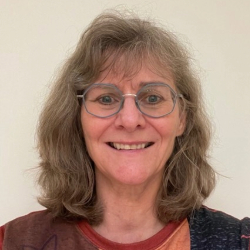
Ulrike Meier Yang
Affiliation:
Lawrence Livermore National Laboratory
Professional Experience:
Group leader, Mathematical Algorithms & Computing Group, Center for Applied Scientific Computing (CASC), Lawrence Livermore National Laboratory (LLNL) (2019-present)
Computer scientist, CASC, LLNL (1998-present)
Acting deputy division deader, CASC, LLNL (2024-2025)
Group leader, Computational Math Group, CASC, LLNL (2010-2019)
Acting group leader, Computational Math Group, CASC, LLNL (2009-2010)
Acting group leader, Scalable Algorithms Group, CASC, LLNL (2007-2008)
Instructor, University of Illinois at Urbana–Champaign (UIUC) (1995)
Senior computer scientist, Center for Supercomputing Research and Development (CSRD), UIUC (1994-1995)
Consultant, Paracomp Tech., Inc. (1987)
Computer scientist, CSRD, UIUC (1985-1994)
Staff scientist, Wissenschaftlicher Mitarbeiter, Jülich Research Center (1983-1985)
Student assistant, Studentische Hilfskraft, Ruhruniversität Bochum (1980-1983)
Education:
Ph.D., Computer science, University of Illinois at Urbana–Champaign (1995)
Diploma, Mathematics, Ruhruniversität Bochum (1983)
SIAM Activities:
Member, SIAM Systems Oversight Committee (2024-present)
Member, SIAM Board of Trustees (2023-present)
Associate editor, SIAM Journal on Matrix Analysis and Applications (2020-present)
Chair, SIAM Activity Group on Supercomputing (2024-2025)
Member, SIAM Committee on Programs and Conferences (2022-2024)
Co-chair, SIAM Conference on Parallel Processing for Scientific Computing (2020)
Program director, SIAM Activity Group on Supercomputing (2018-2019)
Associate editor, SIAM Journal on Scientific Computing (2011-2016)
Professional Memberships:
Fellow, Society for Industrial and Applied Mathematics (2024)
Member, Society for Industrial and Applied Mathematics
Member, SIAM Activity Group on Computational Science and Engineering
Member, SIAM Activity Group on Equity, Diversity, and Inclusion
Member, SIAM Activity Group on Linear Algebra
Member, SIAM Activity Group on Supercomputing
Research Interests:
Numerical algorithms with a particular focus on iterative linear system solvers and algebraic multigrid methods
High-performance computing
Parallel algorithms
Performance evaluation and scientific software design
Website:
https://people.llnl.gov/yang11
Candidate Statement:
SIAM is an important society that focuses on the continued development of applied mathematical and computational research needed for solving many real-world problems. It provides many opportunities for researchers in mathematics, computational science, computer science, and other areas to exchange research ideas through its conferences and journals. I have enjoyed being involved in various SIAM activities throughout the years, including as a member of the Board of Trustees and would be honored to be reelected.
SIAM should continue to pursue diversity—whether it is based on gender, race, geographic location, career stage (from students to senior researchers), institution type (academia, national labs, or industry)—since this is crucial for the continued generation of fresh ideas and the advancement of mathematical and computational research. A rising topic of interest is the use of AI and large language models. SIAM needs to carefully evaluate any risks or complications caused by using such tools, as well as the potential opportunities they provide to improve areas within SIAM, such as conferences, publications, and more. Finally, SIAM should continue to support virtual components of conferences as well as initiatives that support early-career professionals.
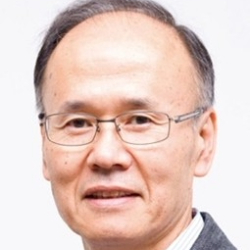
Yasumasa Nishiura
Affiliation:
Hokkaido University
Professional Experience:
Professor emeritus, Hokkaido University (2016-present)
Distinguished professor, Hokkaido University (2022-2023)
Specially appointed professor, Advanced Institute for Materials Research (AIMR), Tohoku University (2017-2019)
Principal investigator, AIMR, Tohoku University (2012-2017)
Program director, Japan Science and Technology Agency, Math Program (2007-2016)
Director, Research Institute for Electronic Science, Hokkaido University (2003-2005)
Professor, Leader of Research Group for Nonlinear Studies and Computation, Research Institute for Electronic Science, Hokkaido University (1995-2012)
Professor, Faculty of Integrates Arts and Science, Hiroshima University (1991-1995)
Associate professor, Faculty of Science, Hiroshima University (1989-1991)
Associate professor, Kyoto Sangyo University (1982-1989)
Visiting assistant professor, Department of Mathematics, University of Michigan (1981-1982)
Lecturer, Kyoto Sangyo University (1978-1982)
Education:
Ph.D., Mathematics, Kyoto University (1982)
M.Math, Osaka University (1975)
B.Math, Kyoto University (1973)
SIAM Activities:
Member, Organizing committee, SIAM Conference on Dynamical Systems (2025, 2019, 2017)
Member, Advisory board, SIAM Activity Group on Dynamical Systems (2020-2021)
Associate editor, Multiscale Modeling and Simulation (2015-2020)
Member, Selection committee, Jürgen Moser Lecture (2014-2015, 2008-2009)
Member, Board of The Japan Society of Industrial and Applied Mathematics (2014)
Associate editor, SIAM Journal on Applied Dynamical Systems (2010-2021)
Professional Memberships:
Fellow, Chubu University (2025)
Fellow, The Japan Society for Industrial and Applied Mathematics (2014)
Member, Society for Industrial and Applied Mathematics
Member, SIAM Activity Group on Dynamical Systems
Member, American Mathematical Society
Member, Mathematical Society of Japan
Research Interests:
Pattern formation in dissipative systems
Multi-scale materials science
Mathematical modeling and computation
Topological data analysis
Website:
https://www.wpi-aimr.tohoku.ac.jp/nishiura_labo/en/
Candidate Statement:
The landscape of science and society is undergoing a profound shift—from traditional deduction toward a new form of induction. Having spent over 40 years in the field of applied mathematics—especially in mathematical modeling, dynamical systems, and scientific computation—I have witnessed firsthand how the evolving complexity of real-world problems demands interdisciplinary approaches and strong collaborative networks. SIAM has long provided a vital platform for addressing such challenges, by supporting cross-disciplinary exchange, nurturing the next generation of researchers, and fostering global collaboration.
Looking forward, SIAM is uniquely positioned to broaden its impact. This includes extending its engagement with interdisciplinary research beyond traditional STEM boundaries into fields such as the social sciences and public policy, where mathematical thinking can offer powerful insights. Equally important is strengthening partnerships with industry to ensure the continued relevance and applicability of members’ work, while opening new professional pathways. In addition, expanding SIAM’s global presence—particularly in Asia and other underrepresented regions—will help build a truly inclusive international community of industrial and applied mathematicians.
It is a great honor to be nominated for the Board election. If elected, I will dedicate myself to advancing SIAM’s mission by promoting inclusivity, interdisciplinary collaboration, and global outreach, thereby contributing to the organization’s continued leadership in shaping the future of industrial and applied mathematics.
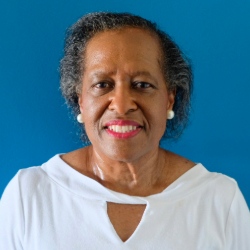
Bonita V. Saunders
Affiliation:
National Institute of Standards and Technology
Professional Experience:
Leader, Mathematical Software Group, Applied and Computational Mathematics Division (ACMD), National Institute of Standards and Technology (NIST) (2022-present)
Research mathematician, ACMD, NIST (1989-2022)
Programmer analyst, BDM Corporation (1985-1989)
Graduate student research fellow, NASA Langley Research Center (1983-1985)
Instructor, Department of Mathematics, Hampton University (1980-1982)
Instructor, Department of Mathematics, Norfolk State University (1979-1980)
Education:
Ph.D., Computational and applied mathematics, Old Dominion University (1985)
M.S., Mathematics, University of Virginia (1979)
B.A., Mathematics, College of William and Mary (1977)
SIAM Activities:
SIAM Engage community moderator, SIAM Activity Group on Orthogonal Polynomials and Special Functions (2022-present)
Member, SIAM Board of Trustees (2020-present)
SIAM Visiting Lecturer (2019-present)
Webmaster, SIAM Activity Group on Orthogonal Polynomials and Special Functions (2000-present)
Member, Executive Committee of Board of Trustees (2025)
Chair, SIAM Systems Oversight Committee (2025)
Member, SIAM Human Resources Committee (2022-2025)
Member, SIAM Systems Oversight Committee (2021-2025)
Member, Organizing committee, SIAM International Meshing Roundtable (2024, 2025)
Member, Selection committee, SIAM Activity Group on Geometric Design Early Career Prize (2024-2025)
Member, Nominating committee, SIAM Activity Group on Geometric Design (2022)
Mailing list moderator, SIAM Activity Group on Orthogonal Polynomials and Special Functions (2000-2021)
Member, Selection committee, SIAM Activity Group on Orthogonal Polynomials and Special Functions Gábor Szegö Prize (2018-2019)
Secretary, SIAM Activity Group on Geometric Design (2016-2018)
Professional Memberships:
Fellow, Washington Academy of Sciences (2019)
Member, Society for Industrial and Applied Mathematics
Member, SIAM Activity Group on Computational Science and Engineering
Member, SIAM Activity Group on Geometric Design
Member, SIAM Activity Group on Orthogonal Polynomials and Special Functions
Member, American Mathematical Society
Member, Association for Women in Mathematics
Member, Mathematical Association of America
Member, National Association of Mathematicians
Research Interests:
Visualization of complex functions data
Numerical software for special functions
Numerical grid/mesh generation
Numerical solution of partial differential equations
Website:
https://math.nist.gov/~BSaunders/
Candidate Statement:
The National Institute of Standards and Technology (NIST), a non-regulatory federal government research laboratory under the Department of Commerce, is funded directly under the U.S. federal budget. Our recent efforts at NIST have led to an influx of mid-level and junior staff at SIAM meetings and active participation in SIAM activity groups.
I would be extremely honored to be re-elected to the SIAM Board of Trustees. To be an effective member of the SIAM Board, one must understand the organization and governance of SIAM. My active membership in several SIAM activity groups has made the learning process a bit easier, allowing me to see how decisions made at the top affect activity groups and SIAM members in general. However, sometimes what we as Board members believe is a fiscally sound choice may appear to be a callous decision at the activity group level. In some instances, understanding the motivations of both sides has helped me propose an amicable solution acceptable to everyone. It’s important that SIAM leadership keep the lines of communication open so that choices that affect SIAM members are clearly explained.
Maintaining our contacts with SIAM staff, activity groups, and sections will aid in this effort. So will encouraging wider use of SIAM’s Engage communities and ensuring that the SIAM website clearly highlights important information about SIAM’s history, mission, leadership and by-laws. These efforts should help cultivate better-informed members who feel confident stepping into leadership roles when opportunities arise.
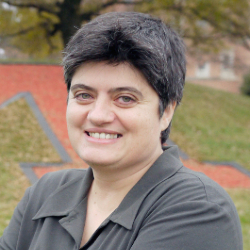
Konstantina Trivisa
Affiliation:
University of Maryland, College Park
Professional Experience:
Founding director, M.S. in Quantum Computing, University of Maryland, College Park (2024-present)
Professor, Institute for Physical Science and Technology, University of Maryland, College Park (2007-present)
Professor of mathematics, University of Maryland, College Park (2007-present)
Director, Institute for Physical Science and Technology, University of Maryland, College Park (2020-2025)
Associate director, Institute for Physical Science and Technology, University of Maryland, College Park (2014-2020)
Director, Applied Mathematics and Statistics, and Scientific Computation Program, University of Maryland, College Park (2007-2018)
Associate professor, Mathematics, University of Maryland, College Park (2004-2007)
Assistant professor, Mathematics, University of Maryland, College Park (2000-2004)
Ralph Boas Assistant professor of mathematics, Northwestern University (1997-2000)
Postdoctoral research associate, Center for Nonlinear Analysis, Carnegie Mellon University (1999-1997)
Education:
Ph.D., Applied mathematics, Brown University (1996)
M.S., Applied mathematics, Brown University (1992)
B.S., Mathematics, University of Patras (1990)
SIAM Activities:
Member, Organizing committee, SIAM Annual Meeting (2022)
Member, Selection committee, SIAM Activity Group on Analysis of Partial Differential Equations Early Career Prize (2020-2021)
Associate editor, SIAM Journal on Mathematical Analysis (2011-2020)
Member, Organizing committee, SIAM Conference on Analysis of Partial Differential Equations (2019)
Member, SIAM Diversity Advisory Committee (2014-2016)
Faculty advisor, University of Maryland, College Park SIAM Student Chapter (2007-2018)
Chair, SIAM Committee on Section Activities (2007-2014)
Chair, Selection committee, SIAM Activity Group on Analysis of Partial Differential Equations Prize (2013)
Chair, Selection committee, SIAM Activity Group on Analysis of Partial Differential Equations Best Paper Prize (2012-2013)
Vice chair, SIAM Activity Group on Analysis of Partial Differential Equations (2011-2012)
Secretary, SIAM Activity Group on Analysis of Partial Differential Equations (2009-2011)
Member, SIAM Committee on Section Activities (2006-2012)
Member, SIAM Education Committee (2006-2010)
Professional Memberships:
Fellow, Society for Industrial and Applied Mathematics (2023)
Fellow, Association for Women in Mathematics (2023)
Member, Society for Industrial and Applied Mathematics
Member, SIAM Activity Group on Analysis of Partial Differential Equations
Member, American Mathematical Society
Member, Mathematical Society of Greece
Research Interests:
Nonlinear analysis and partial differential equations
The mathematics of fluids: modeling, analysis, and simulations
Quantum computing with a focus on the construction of efficient quantum algorithms
Website:
http://www.math.umd.edu/~trivisa
Candidate Statement:
It is an honor for me to be nominated to serve on the Board of the Society for Industrial and Applied Mathematics. SIAM is the leading scientific society for computational and applied mathematics and the place where theory, analysis, and computations meet experiments for the investigation of real-world problems. My involvement with SIAM in the past 30 years has been extensive, ranging from the organization of conferences, workshops, and annual meetings; holding leadership roles in the SIAM Activity Group on Partial Differential Equations, chairing committees on honors and awards, and contributing to the educational mission of the society as a member of the SIAM Education Committee for several years. In 2023, I was elected SIAM Fellow for my accomplishments in nonlinear partial differential equations with a focus on the mathematics of fluid dynamics. My current research is focused on the design of efficient quantum algorithms for applied problems.
I believe that my diverse research interests and accomplishments in applied mathematics, as well as my administrative experience at the University of Maryland (UMD), would greatly support SIAM in pushing forward innovations in research and education. For the last 10 years, I served as Associate Director and then Director of the Institute for Physical Science and Technology, an internationally recognized institute for research at the interface of applied mathematics, physics, biological science, and engineering. In addition, I served for 10 years as Director of the Applied Mathematics and Statistics, and Scientific Computation Program, which reached the top 10 applied mathematics graduate programs in the U.S. during my tenure. More recently, in 2023, I established the Master of Science in Quantum Computing and was awarded an NSF Research Training Grant on the mathematics of quantum information science.
As a member of the SIAM Board, I will use this platform to advocate for the essential role of interdisciplinary research and to help catalyze new areas of research and advance the field of applied mathematics. SIAM plays a critical role in fostering interdisciplinary connections and promoting education and training, and I believe we can double down on these strengths to help catalyze new scientific discoveries. At the core of a thriving society is a robust, engaged, and diverse membership, and I will serve as a steward for the growth of the society. I am looking forward to working with the other members of the board and making the impossible possible.
Council Members-at-Large

Luis Chacon
Affiliation:
Los Alamos National Laboratory
Professional Experience:
Scientist, Los Alamos National Laboratory (2012-present)
Deputy group leader, Los Alamos National Laboratory (2014-2015)
Scientist, Oak Ridge National Laboratory (2008-2012)
Technical staff member, Los Alamos National Laboratory (2002-2008)
Director's postdoctoral fellow, Los Alamos National Laboratory (2000-2002)
Education:
Ph.D., Industrial engineering, Polytechnic University of Madrid (2001)
Ph.D., Nuclear engineering, University of Illinois, Urbana-Champaign (2000)
M.S., Nuclear engineering, University of Illinois, Urbana-Champaign (1997)
M.S., Industrial engineering, Polytechnic University of Madrid (1994)
SIAM Activities:
Chair, Selection committee, James H. Wilkinson Prize in Numerical Analysis and Scientific Computing (2025)
Presenter, SIAM Conference on Computational Science and Engineering (2013, 2015, 2017, 2019, 2021, 2023, 2025)
Guest editor, SIAM Journal on Scientific Computing (2016, 2018, 2020, 2022, 2024)
Presenter, SIAM Conference on Parallel Processing for Scientific Computing (2012, 2018, 2022)
Member, SIAM Conference on Analysis of Partial Differential Equations Organizing Committee (2019)
Presenter, SIAM Annual Meeting (2014)
Professional Memberships:
Fellow, Society for Industrial and Applied Mathematics (2025)
Fellow, American Physical Society (2020)
Member, Society for Industrial and Applied Mathematics
Member, SIAM Activity Group on Supercomputing
Research Interests:
Numerical analysis
Iterative methods for large linear and nonlinear systems
Numerical solution of multiphysics partial differential equations
High-performance computing
Plasma physics and nuclear fusion
Website:
https://laro.lanl.gov/esploro/profile/luis_chacon/overview
Candidate Statement:
I am honored to be nominated for election to the SIAM Council. Since joining SIAM in 2011, and now as a Fellow in 2025, I have valued SIAM as an inspiring scientific home—broad in scope, open-minded in spirit, and committed to excellence. It has provided me with a wealth of ideas, collaborations, and friendships that have enriched my career.
SIAM’s strength lies in connecting communities across academia, national laboratories, and industry, and in advancing mathematics that addresses real-world challenges. Its conferences, journals, and programs create a unique environment where high-quality science thrives, and diverse perspectives meet.
Today’s scientific landscape faces significant challenges, from pressures on research funding and independence to uncertainties in international collaboration. In this environment, SIAM’s role as a trusted convener and advocate for our field is more important than ever.
If elected, I will work to ensure SIAM continues to support vibrant venues for knowledge exchange, foster the next generation of applied mathematicians, and maintain the openness and quality that define our community. I am committed to helping SIAM remain a dynamic and inclusive organization that not only supports our current members but also inspires future leaders in applied and industrial mathematics.
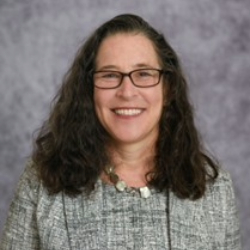
Rachel Levy
Affiliation:
North Carolina State University
Professional Experience:
Executive director, Data Science and AI Academy (DSA) and Professor, Mathematics, North Carolina State University (2021-present)
Congressional policy fellow, American Mathematical Society-Association for the Advancement of Science (2020-2021)
Deputy executive director and staff principal investigator, Mathematical Association of America (2018-2020)
Associate dean for faculty development, Harvey Mudd College (2015-2018)
Professor, Mathematics, Harvey Mudd College (2015-2019)
Associate professor, Mathematics, Harvey Mudd College (2011-2015)
Iris and Howard Critchell Chair, Harvey Mudd College (2011-2012)
Avery professor, Claremont Graduate University, Spring (2011)
Assistant professor, Mathematics, Harvey Mudd College (2007-2011)
Postdoctoral research associate, Mathematics, Duke University (2005-2007)
Graduate research assistant, mathematics, North Carolina State University (2001-2005)
Upper school dean, Carolina Friends School (1999-2001)
Upper school faculty, Carolina Friends School (1997-2001)
Middle school faculty, Carolina Friends School (1991-1995)
Mathematics director, Duke University Talent Identification Program (1990-1991)
Instructor, Duke University Talent Identification Program (1987-1990)
Education:
Ph.D., Applied mathematics, North Carolina State University (2005)
M.S., Applied mathematics, North Carolina State University (2003)
M.A., Educational media and instructional design, University of North Carolina at Chapel Hill (1996)
B.A., Mathematics and honors in english, Oberlin College (1989)
SIAM Activities:
SIAM representative, Task Force on Data Science Education (2023-present)
Member, Organizing committee, SIAM Activity Group on Applied Mathematics Education Conference (2024)
Co-founder and fundraiser, BIG Math Network (2018-2022)
SIAM Vice President for Education (2015-2018)
Member, SIAM Council (2015-2018)
SIAM representative, Conference Board of the Mathematical Sciences (2014-2018)
Chair, Selection committee, SIAM Student Paper Prize (2014-2018)
Member, SIAM Education Committee (2009-2018)
Developer, Math Modeling Hub (2018)
Organizer, career panels at SIAM meetings (2016, 2017)
Associate editor, SIAM Undergraduate Research Online (2015-2017)
Member, Organizing committee, SIAM Annual Meeting (2016)
Developer, SIAM communication doctor booth (2015-2016)
Member, SIAM Career Opportunities Committee (2015-2016)
Author, SIAM News articles (2013-2016)
Organizer, SIAM booth at USA Science and Engineering Festival (2015)
Lead author, SIAM Report on Undergraduate Degree Programs in Applied Mathematics (2015)
Judge, M3 Challenge (2013-2015)
Co-facilitator, press communication workshop with Flora Lictman (2014)
Editor-in-Chief, SIAM Undergraduate Research Online (2013-2014)
Associate editor, SIAM Undergraduate Research Online (2012)
Organizer, SIAM booth at USA Science and Engineering Festival (2010)
Faculty advisor, Harvey Mudd College SIAM Student Chapter (2009-2012)
SIAM representative, meeting on K-12 standards (2009)
Recipient, SIAM Student Paper Prize (2005)
President, North Carolina State University SIAM Student Chapter (2004-2005)
Professional Memberships:
Fellow, Society for Industrial and Applied Mathematics (2021)
Fellow, Leadership North Carolina Fellow (2023-2024)
Fellow, AMS-AAAS Congressional Science and Technology Policy Fellow (2020-2021)
Fellow, Project NexT, American Institute of Mathematics (2007)
Fellow, Microsoft Future Professors (2003-2004)
Member, Society for Industrial and Applied Mathematics
Member, SIAM Activity Group on Applied Mathematics Education
Member, SIAM Activity Group on the Life Sciences
Research Interests:
Fluid mechanics
Industrial mathematics
Bio-inspired design
Partial differential equations
Mathematical modeling, data science, and AI education and policy
Website:
https://datascienceacademy.ncsu.edu/
Candidate Statement:
In a rapidly changing world, SIAM provides us with a professional community that supports us at every career stage. One thing I valued deeply in my experience as SIAM Vice President for Education was a front-seat view of the Board and Council collaborating with the staff to steward the organization and make thoughtful decisions.
SIAM is already doing the important work of building community and championing research through activity groups, conferences, and publications. SIAM provides critical student support through chapters, publications, prizes, and networking. SIAM engages the public through policy advocacy and outreach to K-12 students and the general public.
As Executive Director of the Data Science and AI Academy at North Carolina State University, I am highly aware of the challenges and opportunities accelerated by the use of machine learning (ML) / artificial intelligence (AI). I am responsible for developing mechanisms to help academic, government, industry, and non-profit organizations adapt. For example, as a publisher, SIAM will face challenges accelerated by inappropriate use of AI, such as how to distinguish authentic work and how to facilitate effective peer reviews. As an international organization, SIAM policies and practices will need to adapt to globally changing tools, policies, and environments, while staying true to its core mission and values.
SIAM will remain vital by finding ways to engage all its members—those able to travel to conferences and those who cannot. By listening to constituents and collaborating with peer organizations, SIAM can generate innovative and exciting ideas to help the organization and its members thrive in the future.
SIAM has been my professional home since graduate school. If elected as a council member, I would offer experience with SIAM as a Vice President, Fellow, editor-in-chief, developer of a bipartisan and bicameral bill in the U.S. Congress, author, committee member and chair, conference organizer, M3 Challenge advisor and judge, student chapter founder, and longtime member. I would also bring experience from national service on the Conference Board of the Mathematical Sciences, Transforming Postsecondary Education in Mathematics, the National Academies Roundtable on Postsecondary Data Science Education, and as a developer of education, health, and workforce policy. I have served peer organizations as MAA Deputy Director, AMS Science and Technology Policy Fellow, AWM committee member, NCTM advisor to the president, and member of NAM, ASA, INFORMS, and SACNAS.
I am dedicated to SIAM’s success and would be honored to collaborate with colleagues and provide guidance as a member of the SIAM Council.
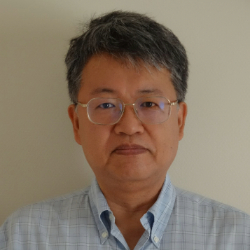
Kengo Nakajima
Affiliation:
The University of Tokyo/RIKEN R-CCS
Professional Experience:
Deputy director, RIKEN Center for Computational Science (2018-present)
Professor, Supercomputing Research Division, Information Technology Center, The University of Tokyo (2008-present)
Associate professor, Department of Earth and Planetary Science, The University of Tokyo (2004-2008)
Senior technical staff, Research Organization of Information Science and Technology (1999-2004)
Senior staff researcher, Mitsubishi Research Institute, Inc. (1985-1999)
Education:
Ph.D., Applied mathematics, The University of Tokyo (2003)
M.S., Aerospace engineering and engineering mechanics, The University of Texas at Austin (1993)
B.Eng., Aeronautics, The University of Tokyo (1985)
SIAM Activities:
Member, SIAM Committee on Programs and Conferences (2024-2026)
Chair, Selection committee, SIAM Activity Group on Supercomputing Career Prize (2023-2024)
Chair, Selection committee, SIAM Activity Group on Supercomputing Early Career Prize (2023-2024)
Member, Selection committee, SIAM Activity Group on Supercomputing Career Prize (2019-2020)
Member, Selection committee, SIAM Activity Group on Supercomputing Early Career Prize (2019-2020)
Co-chair, SIAM Conference for Parallel Processing in Scientific Computing (2017-2018)
Associate editor, SIAM Journal on Scientific Computing (2007-2012)
Member, Organizing committee, SIAM Conference on Computational Science and Engineering (2013)
Member, Organizing committee, SIAM Conference on Parallel Processing for Scientific Computing (2008, 2004)
Co-organizer of minisymposia, SIAM Annual Meeting (2012, 2013)
Co-organizer of minisymposia, SIAM Conference on Computational Science and Engineering (2025, 2023, 2021, 2019, 2017, 2015, 2011, 2009)
Co-organizer of minisymposia, SIAM Conference on Parallel Processing for Scientific Computing (2026, 2024, 2022, 2020, 2018, 2016, 2014, 2012, 2010, 2008, 2006)
Professional Memberships:
Fellow, Japan Society for Computational Engineering and Science (2025)
Council member, International Association for Computational Mechanics (2009-present)
Council member, Japan Society for Industrial and Applied Mathematics (2008-2020)
Director, Japan Society for Computational Engineering and Science (2014-2017)
Council member, Japan Society for Computational Engineering and Science (2009-2014)
Member, Society for Industrial and Applied Mathematics
Member, SIAM Activity Group on Computational Science
Member, SIAM Activity Group on Geosciences
Member, SIAM Activity Group on Supercomputing
Member, SIAM Activity Group on Uncertainty Quantification
Member, Association for Computing Machinery Special Interest Group on High-Performance Computing
Member, Information Processing Society of Japan
Member, Institute of Electrical and Electronics Engineers Computer Society
Research Interests:
Computational mechanics, computational fluid dynamics
Numerical linear algebra, parallel iterative algorithms, parallel preconditioning methods, multigrid methods
Parallel programming models
Adaptive mesh refinement, parallel visualization method
AI for Science, integration of simulation/data/learning
Quantum-HPC hybrid computing
Websites:
https://www.r-ccs.riken.jp/en/about/leadership/
https://h3-open-bdec.cc.u-tokyo.ac.jp/
Candidate Statement:
My original main areas of expertise are computational mechanics and computational fluid dynamics (CFD), and my research trajectory has gradually expanded to numerical linear algebra, with a particular focus on parallel iterative methods and preconditioning in large-scale computing environments. I have made significant contributions to the field of high-performance computing (HPC), having published over 100 peer-reviewed papers and delivered over 100 invited and keynote talks at international conferences.
In recent years, my focus has shifted to interdisciplinary efforts integrating computational science, data science, AI (commonly referred to as “AI for Science”), and related fields. Notable among these are the “h3-Open-BDEC” project (2019–2023), supported by Japan Society for the Promotion of Science (JSPS), and the ongoing “JHPC-Quantum” project (2023–2028), funded by New Energy and Industrial Technology Development/The Ministry of Economy, Trade and Industry (NEDO/METI), which explores Quantum-HPC hybrid computing. These efforts have received considerable international recognition. I have also played leading roles in major international collaborative projects such as ESSEX-II for the development of linear solvers in the Exascale Era (Japan-Germany, FY.2015-2018) and HANAMI (FY.2024-2026) under the EuroHPC-Japan framework.
Throughout my career, I have worked on interdisciplinary research that combines the disciplines of computational science: scientific modeling, numerical algorithms, and computer science. My recent work on "AI for Science" further reflects the convergence of computational science, data science, and ML/AI.
I joined SIAM in 1996, drawn by its interdisciplinary character and the breadth of its activity groups. My engagement has been particularly strong in the supercomputing (SC) and computational science and Engineering (CSE) communities. Over the past two decades, I have consistently participated in the SIAM Conference on Parallel Processing (PP) and SIAM Conference on Computational Science and Engineering, organizing numerous minisymposia and contributing to their vibrant, cross-disciplinary discourse.
Looking ahead, the integration of AI across scientific domains is poised to accelerate innovation. I am committed to leveraging my experience to help SIAM play a central role in this transformation. The “Industrial” dimension of SIAM is especially relevant, as collaboration between academia and industry is essential for advancing foundational models in generative AI. My background in industry positions me well to foster such partnerships.
SIAM’s international reach is another vital asset. In 2018, I served as general co-chair for SIAM PP—the first held in Asia—and have actively contributed to global conference organization, including HPCAsia 2022, IEEE Cluster 2024, and SCA/HPCAsia 2026. I am particularly eager to increase the participation of the SIAM Activity Group on Supercomputing and the SIAM Activity Group on Computational Science and Engineering from Asia, thereby enhancing SIAM’s global engagement and fostering deeper international collaboration.
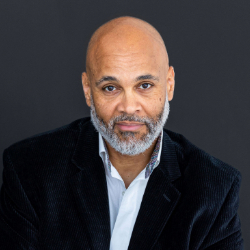
William Pack
Affiliation:
Leonardo DRS Electro-Optical & Infrared Systems
Professional Experience:
Leonardo DRS Electro-Optical & Infrared Systems (2024-Present)
External advisory council, The University of Texas at Dallas, Department of Mathematical Sciences (2016-Present)
Raytheon (2002-2024)
Education:
M.S., Applied mathematics, University of New Orleans (2001)
B.S., Mathematics, University of New Orleans (1998)
SIAM Activities:
Member, SIAM Industry Committee (2024-Present)
Member, Selection committee, SIAM Industry Prize (2024-2025)
Member, SIAM Membership Committee (2021-2023)
International Congress for Industrial and Applied Mathematics 2031 (ICIAM 31)
Professional Memberships:
Member, Society for Industrial and Applied Mathematics
Member, National Society of Black Engineers
Member, National Association of Mathematicians
Research Interests:
Numerical methods for EO/IR sensor characterization
Image processing techniques for finding dim targets in high-clutter imagery
2D surface fitting techniques for time evolution image background subtraction
AI/ML techniques for Statistical Process Control (SPC)
Website:
www.linkedin.com/in/williampack
Candidate Statement:
It is with great enthusiasm that I submit my candidacy for the Society for Industrial and Applied Mathematics Council. Having been an active member of SIAM for many years, I have a deep appreciation for its role in advancing the mathematical sciences. If elected, I will work diligently to ensure SIAM continues to be a vibrant, inclusive, and forward-thinking organization that serves all its members.
A central focus of my service will be to champion mathematics education at the undergraduate and master's levels. These programs are the bedrock upon which the future of our field is built. We must ensure that our curricula are not only rigorous but also relevant, equipping students with the skills needed for the modern workforce. This means fostering stronger connections between academia and industry, promoting internship and co-op opportunities, and supporting faculty in developing innovative teaching methods that inspire the next generation of applied mathematicians. By strengthening these educational foundations, we create a robust pipeline of talent ready to tackle the complex challenges of our time.
Furthermore, we are at a pivotal moment where the disciplines of data science and artificial intelligence are reshaping the scientific and industrial landscape. I firmly believe that these fields represent the future of applied mathematics and statistics. The theoretical underpinnings of today’s AI and machine learning breakthroughs are rooted in optimization, linear algebra, and probability—core tenets of our community. SIAM is uniquely positioned to lead this evolution. As a council member, I would advocate for increased investment in conferences, publications, and activity groups centered on data science and AI. We must actively bridge the gap between traditional applied mathematics and these emerging areas, ensuring that our members are at the forefront of discovery and innovation.
I am eager to bring my experience and vision to the SIAM Council. I am committed to listening to the needs of our members and working collaboratively to keep SIAM at the cutting edge of the mathematical sciences. Thank you for your consideration.
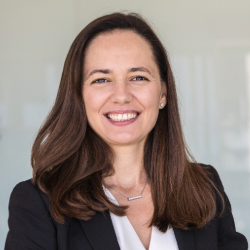
Noemi Petra
Affiliation:
University of California, Merced
Professional Experience:
Professor, Applied mathematics, School of Natural Sciences, University of California (2025-present)
Chair, Applied mathematics undergraduate program, University of California (2023-present)
Associate professor, Applied mathematics, School of Natural Sciences, University of California (2020-2025)
Assistant professor, Applied mathematics, School of Natural Sciences, University of California (2014-2020)
Post-doctoral research associate, The University of Texas at Austin, Oden Institute for Computational Engineering and Sciences (2011-2014)
ICES Post-Doctoral Fellow (now “Peter O’Donnell Jr. Postdoctoral Fellowship”), The University of Texas at Austin, Oden Institute for Computational Engineering and Sciences (2010-2011)
Education:
Ph.D., Applied mathematics, University of Maryland (2010)
M.S., Computer science, Babeș-Bolyai University (2003)
B.S., Mathematics and computer science, Babeș-Bolyai University (2002)
SIAM Activities:
Associate editor, Research Spotlights, SIAM Review (2025-present)
Chair, Selection committee, Association for Women in Mathematics-SIAM Sonia Kovalevsky Lecture Prize (2024-present)
Chair and founding officer, Northern Central California Section of SIAM (2024-present)
Member, Organizing committee, First SIAM Northern and Central California Sectional Conference (2024)
Associate editor, SIAM/ASA Journal on Uncertainty Quantification (2023-present)
Chair, Selection committee, SIAM Activity Group on Geoscience Career Prize (2024-2025)
Chair, Selection committee, SIAM Activity Group on Geoscience Early Career Prize (2024-2025)
Member, Organizing committee, SIAM Conference on Uncertainty Quantification (2022)
Member, Selection committee, SIAM Activity Group on Uncertainty Quantification Early Career Prize (2021-2022)
Member, Organizing committee, SIAM Conference on Uncertainty Quantification (2020)
Co-organizer, Gene Golub SIAM Summer School (2018)
Secretary, SIAM Activity Group on Uncertainty Quantification (2017-2018)
Faculty adviser, University of California, Merced SIAM Student Chapter (2016-2023)
Vice president, University of Maryland, Baltimore County SIAM Student Chapter (2008-2010)
Professional Memberships:
Member, Society for Industrial and Applied Mathematics
Member, SIAM Activity Group on Computational Science and Engineering
Member, SIAM Activity Group on Geosciences
Member, SIAM Activity Group on Optimization
Member, SIAM Activity Group on Uncertainty Quantification
Member, Association for Women in Mathematics
Member, Inverse Problems International Association
Research Interests:
Inverse problems and optimization governed by differential equations
Bayesian inference and uncertainty quantification
Optimal experimental design
Website:
http://faculty.ucmerced.edu/npetra/
Candidate Statement:
SIAM is the leading international society for mathematical and computational scientists. Its conferences, top-tier journals and books, and educational support form a critical platform and community for mathematicians working in the sectors of academia, national laboratory, industry, and government. SIAM has played a significant role in my academic career since joining this community as a graduate student. To give back, over the years, I became involved in various research and educational activities. From a service perspective, perhaps the most notable activities are my involvement as the faculty advisor of the UC Merced SIAM Student Chapter and the recent establishment of the Northern and Central California (SIAM-NCC) Section of SIAM. I strongly believe in the education and mentorship of future generations of mathematicians and professionals. As such, I enjoyed being our local student chapter’s faculty advisor for several years. As the chair of SIAM-NCC, my primary goal is to create opportunities for SIAM members from various types of institutions in the region to connect and present their work. Many of our members—whether due to childcare issues, financial situation, affiliation’s research status, and time and schedule constraints—often struggle to attend national and international meetings.
I am very grateful for this nomination, and it would be a great honor to support the SIAM community by serving as a member of the SIAM Council for the next term. I believe that SIAM’s role in advocating the significance of science and raising awareness of the importance of rigorous mathematics is timely and critical. If elected, I hope to bring my experience as a researcher, mentor, and SIAM-NCC Section chair to contribute to SIAM’s vision of fostering excellence in research, education, and outreach.
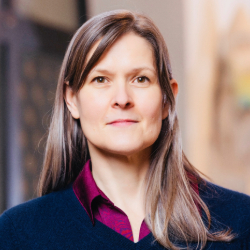
Jennifer K. Ryan
Affiliation:
KTH Royal Institute of Technology
Professional Experience:
Professor, KTH Royal Institute of Technology (2023-present)
Division head, KTH Royal Institute of Technology (2023-present)
Associate professor, KTH Royal Institute of Technology (2022-2023)
Guest professor, Uppsala University (2020-2022)
Associate professor, Colorado School of Mines (2019-2022)
Visiting professor (DAAD Fellow), Heinrich Heine University Düsseldorf (2018-2019)
Senior lecturer, University of East Anglia (2015-2019)
Lecturer, University of East Anglia (2012-2015)
Senior assistant professor, Delft University of Technology (2011-2012)
Assistant professor, Delft University of Technology (2008-2011)
Assistant professor, Virginia Tech (2005-2007)
Householder postdoctoral fellow, Oak Ridge National Lab (2003-2005)
Education:
Ph.D., Applied mathematics, Brown University (2003)
M.S., Mathematics, Courant Institute of Mathematical Sciences, New York University (1999)
B.A., Applied mathematics, Rutgers University-Newark (1996)
SIAM Activities:
Member, SIAM Prize Canvassing Committee (2024-current)
Mentor, ICERM/SIAM Workshop on Empowering a Diverse Computational Mathematics Research Community (2024)
Member, Selection committee, AWM-SIAM Sonia Kovalevsky Lecture (2021-2023)
Member, Selection committee, SIAM Student Paper Prize (2017-2021)
Professional Memberships:
Member, Society for Industrial and Applied Mathematics
Member, SIAM Activity Group on Computational Science and Engineering
Member, SIAM Activity Group on Equity, Diversity, and Inclusion
Member, SIAM Activity Group on Applied Mathematics Education
Member, American Mathematical Society
Member, Association for Women in Mathematics
Member, European Women in Mathematics
Member, London Mathematical Society
Research Interests:
Filtering for accuracy enhancement
Numerical analysis and scientific computing
High-order methods for the solution to hyperbolic PDEs
Website:
jenniferkayryan.com
Candidate Statement:
SIAM provides valuable opportunities that facilitate high-quality research, supports career development, and enables engagement across disciplines. I have benefited from SIAM, and value the community that SIAM has been pivotal in creating. Over the last decade, I have been pleased to serve SIAM and further its mission through participating in award committees and activity groups. I would be honored to serve as a council member, if elected.
The continued impact of mathematics on societal and scientific advancements requires intellectual exchange between different fields of research, across organizational structures, as well as globally. SIAM’s activities provide venues for these intellectual exchanges — whether it be a conference, a journal article, or an activity group. I believe that my experiences working in the U.S., the Netherlands, the UK, Germany, and Sweden provide a broad and diverse perspective that would be beneficial to SIAM’s activities. If elected, I will enthusiastically work with SIAM leadership to support activities that provide opportunities for vibrant intellectual exchange and promote collaboration as well as career development for the next generation.
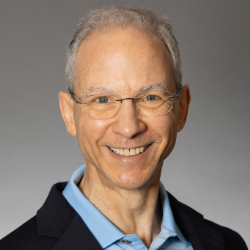
Jeffrey R. Sachs
Affiliation:
Merck Research Laboratories, Merck & Co., Inc., USA
Professional Experience:
Distinguished scientist/Executive director, Quantitative Pharmacology and Pharmacometrics Department, Merck Research Laboratories (2021-present)
Senior principal investigator, Modeling and Simulation Department, Merck Research Laboratories, Merck & Co., Inc., USA (2012-2021)
Senior investigator, Modeling and Simulation Department, Merck Research Laboratories, Merck & Co., Inc., USA (2010-2012)
Director and senior investigator, Applied Computer Science and Mathematics Department, Merck & Co., Inc., USA (2004-2010)
Senior research fellow, Applied Computer Science and Mathematics Department, Merck & Co., Inc. USA (1999-2004)
Independent mathematical biotechnology consultant (1998-1999)
Associate, then Senior associate, then Operating center manager, Daniel H. Wagner Associates (1992-1998)
American Society for Engineering Education Postdoctoral fellow, American Society for Engineering Education, U.S. National Institute of Standards and Technology Biotechnology Division (1990-1992)
Postdoctoral fellow, Biomedical engineering, Northwestern University (1989-1990)
Visiting assistant professor, Math and Computer Science Department, Clarkson University (1989)
Visiting scholar, Department of Mathematics, Massachusetts Institute of Technology (1988-1989)
Starr postdoctoral fellow, Department of Applied Physics, Tokyo University (1987-1988)
Education:
Certificate, American Course on Drug Development and Regulatory Sciences, University of California San Francisco (2013)
Ph.D., Applied mathematics, Massachusetts Institute of Technology (1987)
B.S. and M.S., Applied mathematics, Brown University (1981)
SIAM Activities:
Member, SIAM Book Committee (2020-present)
Member, SIAM Industry Committee (2017-present)
Editorial board, Math in Industry book series (2015-present)
Featured mathematician, SIAM careers brochure (2023)
Participant, educational video on vaccine math (2021)
Featured mathematician, SIAM careers brochure (2003)
Member, Organizing committee, SIAM Conference on Computational Science and Engineering (2021-2023)
Member, Organizing committee, SIAM Conference on the Life Sciences (2017-2018)
Member, Editorial board, Frontiers in Applied Mathematics book series (2000-2003)
Professional Memberships:
Member, Society for Industrial and Applied Mathematics
Member, SIAM Activity Group on Life Sciences
Member, SIAM Activity Group on Computational Science and Engineering
Member, SIAM Activity Group on Data Science
Member, SIAM Activity Group on Uncertainty Quantification
Member, Association for Women in Mathematics
Mentor, Association for Women in Mathematics
Member, Scientific advisory board, CAMS, New Jersey Institute of Technology
Member, International Society of Pharmacometrics
Member, Board of Directors, International Society of Pharmacometrics
Board of directors co-liaison, Awards committee, International Society of Pharmacometrics
Board of directors co-liaison, Education committee, International Society of Pharmacometrics
Mentor, International Society of Pharmacometrics
Research Interests:
Impact on human or animal health through the application of quantitative methods
Non-linear mixed effects (pharmacokinetics and pharmacodynamics)
Model-based meta-analysis and logistic regression
Time-to-event-related modeling for vaccine development
AI and ML method development for biological inference: clustering, network reverse-engineering, and gene annotation
Fluid mechanics
PDE models of electro-mechanochemistry of poroelastic media
Stochastic processes
Signal processing for speech and speaker recognition and ultrasound
Stochastic optimization (anti-submarine warfare)
Website:
https://www.linkedin.com/in/biomath/
Candidate Statement:
It is an honor to be nominated to run for a seat on the SIAM Council. SIAM, through its technically, geographically, and professionally diverse membership, inspires and enables impactful interactions between mathematics and science, engineering, and society. It also provides materials that enable the education and motivation of future practitioners. The conferences, workshops, journals, and book series all contribute to this, as does SIAM’s online material and social media activity.
Should I be elected, I will endeavor to help SIAM to further enhance its leadership by focusing on how our community can work with others to answer questions such as:
- How can we continue to improve how we expand and convey to the public and future generations the role mathematics plays in modern lives through economics, engineering, healthcare, manufacturing, AI, and beyond?
- How do we convey early and broadly enough (to children and young adults) the myriad professional possibilities that mathematics, thus, opens?
- How do we best employ this plethora of opportunities to bring new generations to our field and to SIAM, especially those who might not continue their education to a Ph.D. or even beyond high school?
- How could this be leveraged to enhance economic development where most needed?
- How can we leverage AI to make us even better and faster at what we (SIAM membership as well as SIAM itself) do best, and how can we leverage what we do best to make AI even better (i.e., more helpful)?
- What other new fields should we be engaging with, and how?
The experience I have gained as a member of the Board of Directors for the International Society of Pharmacometrics has already involved a better understanding of SIAM and of the need to, and ways to, work on these issues, and so could help me be effective on the Council.
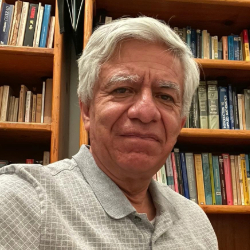
Jorge X. Velasco-Hernandez
Affiliation:
Instituto de Matemáticas UNAM-Querétaro
Professional Experience:
Investigador Titular C. Instituto de Matemáticas UNAM (2013-present)
Program director, Applied mathematics and computation, Dirección de Investigación y Posgrado, Instituto Mexicano del Petróleo (2004-2013)
Profesor Titular C. Departamento de Matemáticas, División de Ciencias Básicas e Ingeniería, UAM-Iztapalapa (1996-2003)
Profesor Titular B. Departamento de Matemáticas, División de Ciencias Básicas e Ingeniería, UAM-Iztapalapa (1993-1996)
Profesor Titular A. Departamento El Hombre y su Ambiente, División de Ciencias Biológicas y de la Salud, UAM-Xochimilco (1992-1993)
Education:
Postdoctoral research associate, Cornell University (1991-1992, 1994-1996)
Ph.D., Mathematics, The Claremont Graduate School (1987-1991)
M.S., Mathematics, UAM Unidad Iztapalapa (1983-1986)
Biologist, UAM Unidad Xochimilco (1977-1981)
SIAM Activities:
Member, Editorial board, SIAM Journal of Life Sciences (SIALS) (2025-present)
Member, SIAM Fellows Canvassing Committee (2022-2024)
Vice President, México Section of SIAM (2018-2021)
Professional Memberships:
Fellow, Society for Industrial and Applied Mathematics (2014)
Member, Society for Industrial and Applied Mathematics
Member, Mexican Academy of Science
Member/ ex-President / ex-Treasurer, Sociedad Matemática Mexicana
Member and ex-chair World Outreach Committee, Society for Mathematical Biology
Member, American Mathematical Society
Research Interests:
Mathematical modeling
Mathematical epidemiology
Industrial mathematics
Website:
https://www.matem-juriquilla.unam.mx/Comunidad/Jorge-Velasco
Candidate Statement:
SIAM has been fundamental in shaping my academic career. I have participated in various capacities in the activities generated by the society. My work during my time at the Mexican Petroleum Institute and in the academic environment at the Autonomous Metropolitan University and the National Autonomous University of Mexico has focused on promoting applied mathematics, particularly in various areas of science and technology, with a special emphasis on petroleum and biology. In applied mathematics, it is crucial to foster collaboration among various institutions and specialist teams, promoting multidisciplinary work and cooperation among diverse actors. Another area that is most important for the future of our profession is promoting STEM fields among young people in the region. Opportunities for minorities, particularly women and members of indigenous communities, are crucial. I am very interested in collaboration to promote both above-mentioned issues. It is an honor to participate in this election. If elected to the Council, I will dedicate my professional and personal commitment to upholding the principles and mission of SIAM.
Stay Up-to-Date with Email Alerts
Sign up for our monthly newsletter and emails about other topics of your choosing.



